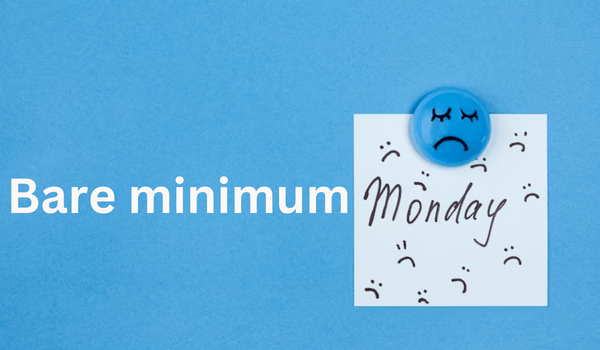Most of us have dealt with Monday morning blues at some point. As students we’ve felt tired and lazy after a fun weekend and made excuses to stay away from school or college. As adult professionals, especially when unhappy at work, we’ve often felt depressed and lethargic at the thought of going to work on a Monday. Then emerged a trend, which was something close to a solution to these blues. Called ‘Bare Minimum Monday’, the phrase was coined by Marisa Jo, a TikTok content creator. Not surprisingly, she came up with it while struggling with the ‘Sunday scaries’ — a feeling of apprehension about the upcoming workweek.
This new idea, which is growing in popularity, suggests that employees only do the bare minimum required to get through Mondays. The term is very much comparable to ‘quiet quitting,’ where workers disconnect from their job and start searching for new opportunities without making a fuss. The only difference is that, ‘bare minimum Monday’ implies putting in lesser than usual effort into an assignment or project, on a Monday. Just the basic effort to get through the first day of the week.
Generally, people tend to get into a weekend mood on Fridays. And now, with the concept of ‘bare minimum Monday’, the start of the week may also see a ‘laid back’ attitude from people. So, when will employees put in their maximum efforts at work? Should there be a day of the week for them to give their all, say ‘Extreme minimum Tuesday or Wednesday’? Shouldn’t employees be doing their best and putting in maximum effort on all days of the week? Are people beginning to grow scared of work? What do such concepts/trends indicate?
“If we allow ourselves to become stagnant, fail to invest the necessary effort, and treat work as a minimal requirement (only working 2 or 2.5 days a week), we will miss out on a significant opportunity”.
Vivek Tripathi, VP-HR, NewGen Software
While India does have a tremendous opportunity to grow and transform, given its current state and potential, Vivek Tripathi, VP – HR, NewGen Software, feels, “If we allow ourselves to become stagnant, fail to invest the necessary effort, and treat work as a minimal requirement (only working 2 or 2.5 days a week), we will miss out on a significant opportunity”.
According to him, this bare minimum effort towards work only means we’re not taking advantage of a golden chance (to learn on the job).
The concept of ‘Bare Minimum Monday’ may seem peculiar because Monday is traditionally seen as a fresh start to the week when everyone returns to work with renewed energy after a break. “People are expected to come in to work on Monday morning full of vigour,” states Manish Majumdar, head – HR, EMS, Centum Electronics. Therefore, he feels, “Monday is supposed to be the day to put in our absolute maximum, to give the right start to the week”.
Why the need for a Bare Minimum Monday at all?
If Monday feels like a day of survival, where one is only doing the bare minimum to get through the day, maybe something isn’t right.
Abuse of weekend
Manish Majumdar, head – HR, EMS, Centum Electronics, opines, “Perhaps the reason behind ‘Bare Minimum Monday’ is the manner in which we spend our weekends.” Many people tend to return to work on Monday feeling more tired because they have exerted themselves over the weekend. Weekends are meant for rejuvenation, rest and recovery so that one can return to work energised. However, if the weekend is spent partying late into the night, not getting enough sleep, or binge-watching shows on platforms such as Netflix and Amazon Prime, exhaustion on a Monday is but natural. That is why people feel the need for a ‘Bare Minimum Monday.’
Apathy towards job
As Tripathi rightly points out, “If one is passionate about and believes in the meaningfulness of one’s work, there is no justification for doing just the bare minimum. Instead, one should strive to do one’s best and achieve one’s maximum potential”. If one does not find their job fulfilling, it may be best to search for a new one. However, all those who are employed, owe it to themselves, their employers and the country to give their work their all.
“Those who are enthusiastic about their work will naturally return to work on Monday with high levels of energy. However, if they are disinterested or disengaged from work, then they will feel like doing just the bare minimum every day, not just on Monday.”
Manish Majumdar, head – HR, EMS, Centum Electronics
Majumdar also agrees and says, “Those who are enthusiastic about their work will naturally return to work on Monday with high levels of energy. However, if they are disinterested or disengaged from work, then they will feel like doing just the bare minimum every day, not just on Monday.”
Lack of planning
With proper planning, Mondays can also go smooth and steady. Majumdar observes, “Often, people struggle with starting their work on Monday because they have multiple pending tasks, and they waste a lot of time deciding which one to tackle first. If they receive an urgent phone call or task in between, their entire schedule goes out the window.”
Are people scared of hard work?
With stress and burnout being discussed more than ever before today, people are focussing on self-care. “It is indeed crucial for people to prioritise their own physical and mental well-being and find meaning in their work and purpose in their life. However, people also owe it to themselves to give their best to their job and avoid falling into the trap of minimal work,” says Tripathi. He goes on to advise, “There is an abundance of opportunities available to the younger generations today, particularly in India, where the largest number of young people are entering the workforce. Instead of settling for minimum work, they should strive to do the maximum to capitalise on these opportunities”.
Majumdar rightly points out, “If people do only the bare minimum on Monday and gradually pick up speed, it will take until Tuesday afternoon or Wednesday morning before they can work at their full capacity. This means, they have wasted at least a day or a day and a half before being fully productive, which is far from ideal for any organisation.”
Suitability for India
While wealthy countries such as Sweden and Norway that only need to maintain their status quo, may find it acceptable, the ‘Bare minimum Monday’ approach is certainlynot suitable for India.
Tripathi does not support the notion of minimum work — avoiding calls in the first half of Mondays and slipping into a weekend mode by lunchtime on Fridays. “Such an attitude is inappropriate for a country with such immense potential. Individuals who are passionate about their work and genuinely believe they are making a difference would not subscribe to this ideology,” believes Tripathi.
We need to build, grow and improve our lives and the lives of future generations. Therefore, employees working in Indian companies must recognise the opportunities available to them and make the most of them.
For young people entering the workforce, it is essential to use their time effectively to learn and grow at the fastest possible rate. “Idally, GenZ — seen as the young and energetic generation— should return to work with enthusiasm on a Monday with a lot of energy and motivation, ready to pick up where they left off on and tackle tasks with gusto,” opines Majumdar.
The concept of some days being minimum days and others for fun weekends will only hinder the progress and opportunities for growth. This is particularly true in industries such as information technology (IT), which rely heavily on knowledge and continuous learning. “If employees limit themselves to the concept of ‘minimum work’ on certain days, they will miss out on opportunities to gain expertise and make meaningful contributions to their work. This is particularly true today, when there is a profusion of young talent in the workforce,” points out Tripathi.
It is important for a young person in the workforce to maximise the learning curve by working hard and making the most of the available opportunities. While it may be acceptable for the older workforces in countries such as Europe and Japan to take it easy, our young workforce needs to put in their best efforts to grow and learn the necessary skills. This is not the time for them to do the bare minimum, but to strive for the absolute maximum. Our economy is not as rich, and therefore, we must work harder to achieve our goals.
‘If people have interest in and passion for what they are doing, regardless of their age, they can still be fully invested in their work. This is evident in the dedication of many startups or entrepreneurs who begin their ventures in their late 40s or 50s and work tirelessly around the clock,” opines Majumdar.
Tripathi believes “The idea should be to aim for the maximum every day, rather than just settling for the bare minimum.”
Sharing his own experience from his time at Daewoo Motors, a Korean auto company, Tripathi recalls how a senior leader revealed that their generation in Korea worked incredibly long hours — up to 18 or 16 hours a day — to build the country’s economy. According to the Korean leader, this level of sacrifice was necessary for growth, and he expressed surprise at the comparatively shorter work hours and desire to go home early among workers in India. Koreans are renowned for their hard work and discipline. “The main takeaway here is that we should learn from countries such as Japan and Korea that have worked hard to achieve success. We cannot afford to relax just because we have a job,” adds Tripathi.
How to tackle the urge to do the bare minimum?
Majumdar recalls a smooth and easy approach to get out of this minimum work mindset — a useful practice that someone shared with him a long time ago, and which he himself started implementing, and found it helpful. On Sunday evening, he suggests, taking a short break and dedicating that time, maybe half an hour to an hour, to plan out Monday. What tasks to begin the week with on returning to work on Monday morning should be given some thought. His advice is, “Organise the week and schedule for the first day of the week because a good start to Monday sets the tone for the rest of the week. I have made it a habit myself, and I also suggest my team members try it out.”
To fight the urge to do just the bare minimum, one must be fully engaged and enthusiastic about their work, spend their weekends right and plan their Mondays accordingly. In the absence of a proper plan for the workday, the events of the day begin to plan a person’s schedule for him/her. Hence, it’s important to be in control of one’s workday and not let it consume all of one’s time.





